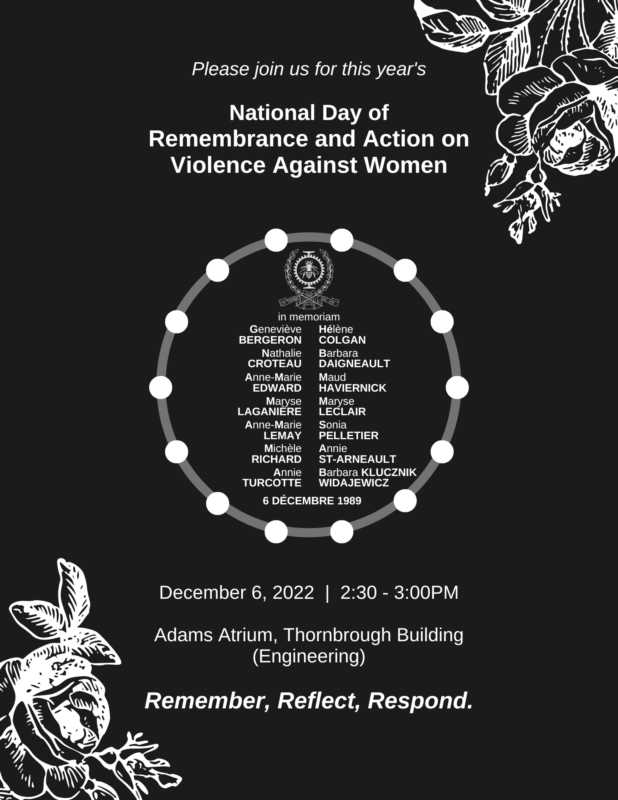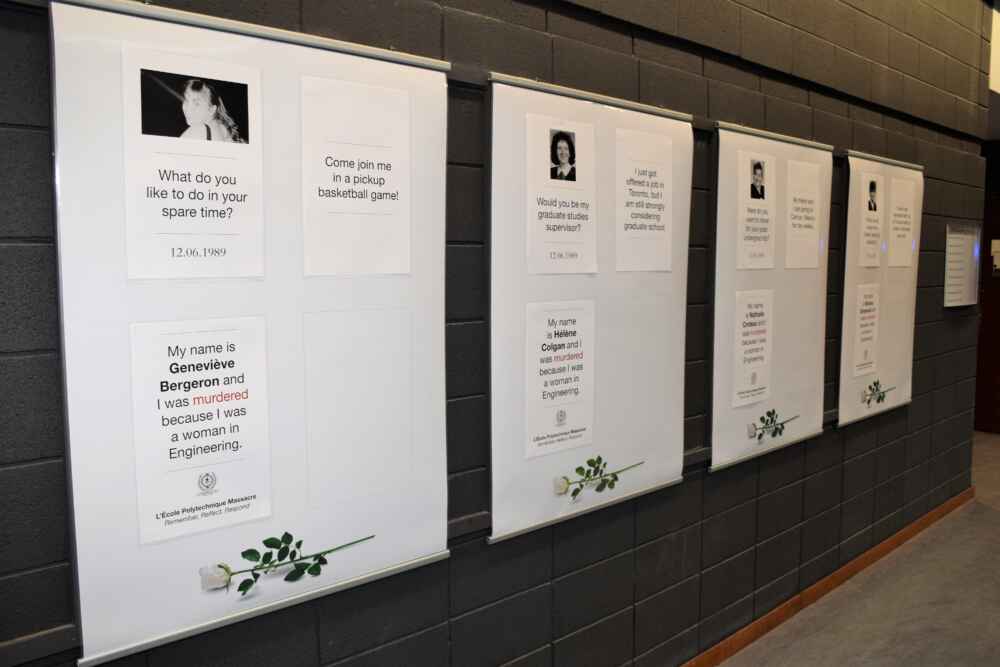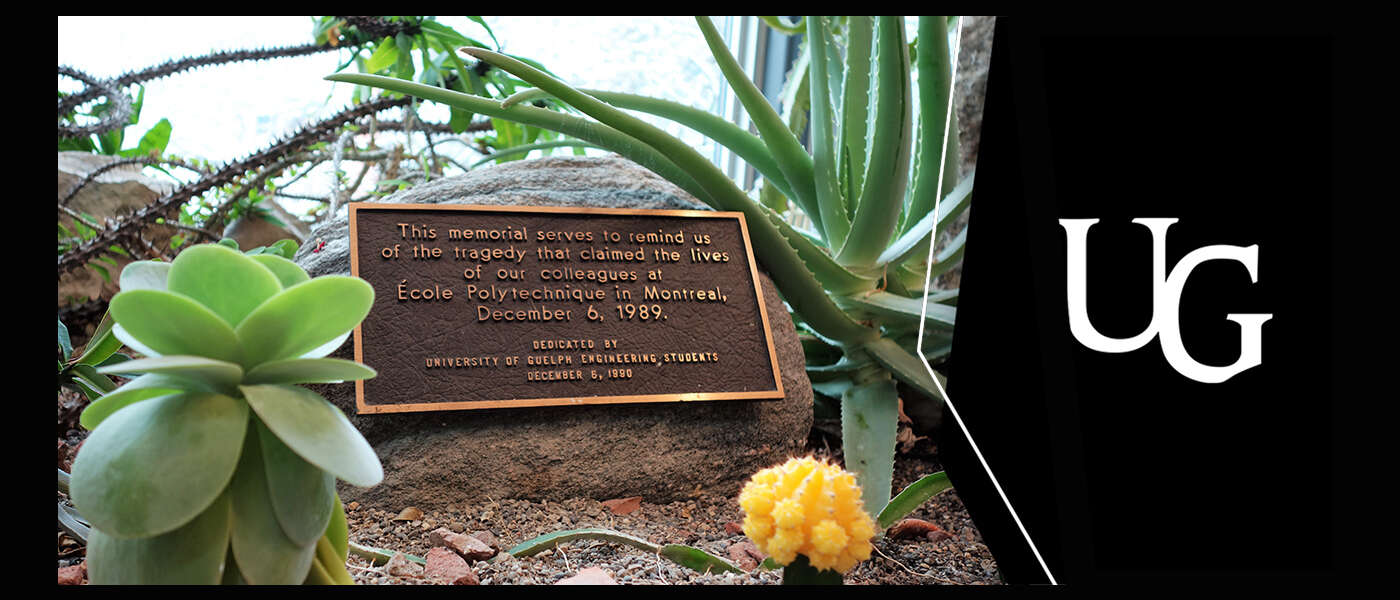
It’s been 33 years since a gunman targeted and murdered 14 women at École Polytechnique in Montreal. The event shocked the nation for its cruelty and senselessness. More importantly, it forced Canadians to confront misogyny.
As each year passes, however, the memory of what happened fades.
Marking the anniversary, and reminding the University of Guelph community why it mattered and continues to matter, is the impetus behind a solemn vigil that takes place every Dec. 6 on campus.
Organized by engineering students, the annual vigil involves faculty, students and staff from across campus in remembering the 14 female engineering students killed in 1989. It’s also an opportunity to reflect on the National Day of Remembrance and Action on Violence Against Women.
This year’s vigil will be held in the Adams Atrium of the School of Engineering Thornbrough Building, beginning at 2:30 p.m. Speakers include engineering professors Dr. Julie Vale and Dr. Jana Levison as well as Dr. John Runciman, director of the school.
The names of the 14 women from École Polytechnique will be read aloud along with “the 15th victim,” representing those who survived the attack but whose lives were forever impacted by the trauma. White roses will be laid at a permanent memorial garden in the building and all campus flags will be lowered to half-mast.
Gender-based violence remains a challenging topic
Jasmine Monique Vergara, who is in her fourth year of mechanical engineering, is the student leader of this year’s vigil. She is also president of the Guelph Engineering Society. The 21-year-old said she grew up knowing little about what many call the Montreal Massacre.
It was only last year, when she was asked to lay a rose during the vigil, that she learned what took place on Dec. 6, 1989, how the gunman entered École Polytechnique with a plan that he laid out in a suicide note to kill “feminists” who he believed had “ruined” his life.
“To hear the story of these women, who they were and how they died, I really found it quite overwhelming. It left me in tears,” said Vergara. “I couldn’t help but think, ‘These women were so much like me. They could have been me.’ They were my age. They were studying mechanical engineering, like I am now. And they had so much potential that never got realized.”
What also struck Vergara was how little she knew about the tragedy.
“This is a major event in Canadian history and in women’s history and I couldn’t believe it’s one I had never really heard about until I came to U of G,” she said.
The annual vigil offers time to reflect on the fact that the women who died that day were not just killed but murdered in an antifeminist attack. Today, we would call these murders femicides, a distinct type of violence rooted in sexism.
The Canadian Femicide Observatory for Justice and Accountability, established by U of G researchers, seeks to increase public awareness and education about femicide.
Even more than 30 years after the violence of Dec. 6, femicide and gender-based violence remain topics most people are reluctant to talk about, Vergara noted. She believes it is her responsibility as engineering society president to continue to share the story of these women so that more students can learn and understand what happened that day.
Still few women choosing engineering

Dr. Abdallah Elsayed also believes in the importance of attending the vigil. As a professor in the School of Engineering, he wants to set an example for male students who may think they don’t need to take part because they don’t see themselves as misogynists or as part of the problem.
“We cannot be idle or just be bystanders,” he said. “We need to be active in this issue and show our support to be part of the change.”
Referring to the vigil’s theme of “remember, reflect and respond,” Elsayed said he believes responding means working to promote more women in engineering to perpetuate the dreams of the 14 women who were never able to begin their careers.
According to Engineers Canada, women make up just 22 per cent of engineering undergraduates, with even lower numbers in the disciplines of mechanical, software and computer engineering.
Elsayed said he’s pleased U of G created the Doody Family Chair for Women in Engineering this year to boost women’s enrolment in engineering programs. He’s also glad to support Go ENG Girl, which invites girls of all ages to campus to learn more about potential engineering careers.
Since the annual Dec. 6 vigil often raises emotions for many people, U of G’s sexual and gender-based violence support coordinator and peers from the Student Support Network will be on hand to offer drop-in supports.
